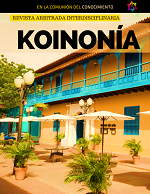Business Intelligence for Organizations
DOI:
https://doi.org/10.35381/r.k.v6i12.1291Keywords:
Organization and method, food industry, statistical data, company, decision making. (Words taken from the UNESCO Thesaurus).Abstract
With the emergence of the COVID-19 pandemic, different industries worldwide suffered different impacts. In the case of the European food industry, the impact was clearly based on the projection and commercial strategies that they normally maintained, which destabilized their normal processes and increased the need to better organize internal processes with business tools such as intelligence. of business. The objective of this article is to analyze how this tool can contribute to decision-making and to know its processes. The research is descriptive with a non-experimental design. The implementation of this tool in the company will support managers to make clearer decisions in order to project their commercial presence in the market in the best possible way, taking into account all the techniques applied in business intelligence.
Downloads
References
Amalia, P. (2012). From Market orientation to the community orientation for an open public administration: A Conceptual Framework. Social & Behavioral Sciences, 62(24), 871-875. https://www.doi.org/10.1016/j.sbspro.2012.09.146
Anderson, E., & Oliver, R. L. (1987). Perspectives on Behavior-Based versus Outcome-Based Salesforce Control Systems. Journal of Marketing, 51(4), 76–88. https://doi.org/10.1177/002224298705100407
Araníbar, J. (2003). Inteligencia de negocios [Business intelligence]. Revista Ciencia y Cultura, (12), 95-101.
Cando-Morales, A., Erazo-Álvarez, J., Álvarez-Gavilanes, J., & Rivera-Costales, J. (2021). La pandemia COVID- 19 en la micro empresa: Emprendimiento e Innovación [The COVID-19 pandemic in micro-enterprises: Entrepreneurship and Innovation]. CIENCIAMATRIA, 7(12), 671-695. https://doi.org/10.35381/cm.v7i12.445
Cano, J. (2007). Business Intelligence. España: ESADE Business.
Davenport, L. P. (2001). Conocimiento en acción. Cómo las organizaciones manejan lo que saben [Knowledge in action. How Organizations Manage What They Know]. Buenos Aires: Prentice Hall.
Fuentes-Pérez, E. (2020). La industria alimentaria frente a la nueva normalidad post COVID-19 [The Food Industry Facing the New Post-COVID-19 Normal]. CienciAméRica, 9(2), 45-50. http://dx.doi.org/10.33210/ca.v9i2.290
Gallegos-González, G., Erazo-Álvarez, J., Narváez-Zurita, C., & Erazo-Álvarez, C. (2021). Marketing de guerrilla en procesos de afiliación voluntaria e independiente del IESS entorno al COVID-19 [Guerrilla marketing in voluntary and independent affiliation processes of the IESS around COVID-19]. CIENCIAMATRIA, 7(12), 752-781. https://doi.org/10.35381/cm.v7i12.448
Giraldo, M. (2020). Coronavirus: ¿Cuáles son las estrategias para enfrentar los desafíos en tiempos de crisis? [Coronavirus: What are the strategies to face the challenges in times of crisis?]. Obtenido de https://n9.cl/43bsr
Inmon, B. (2005). Building the Datawarehouse. (4ta ed.). Estados Unidos: QED Press.
Klebnikov, S. (2020). World Bank forecasts weakest global economic growth since the financial crisis. Recuperado de https://n9.cl/rcq29
Olivares, F. & Lozano, B. (2019). Tendencias de consumo de la industria alimentaria [Food industry consumption trends]. Obtenido de https://n9.cl/wxeb
Peña, A. (2006). Inteligencia de Negocios: Una propuesta para su desarrollo en las organizaciones [Business Intelligence: A proposal for its development in organizations]. Mexico: Instituto Politenico Nacional.
Recasens, J. A. (2011). Inteligencia de negocios y automatización en la gestión de puntos y fuerza de ventas en una empresa de tecnología [Business intelligence and automation in the management of points and sales force in a technology company]. http://repositorio.uchile.cl/handle/2250/104020
Sallis, E., & Jones, G. (2002). Knowledge Management in Education: Enhancing Learning & Education. London: Kogan Page.
Tapia, H. A., Erazo, J. C., Narváez, C. I., & Matovelle, M. M. (2020). Estrategias para fomentar el emprendimiento y desarrollo empresarial [Strategies to promote entrepreneurship and business development]. Revista Arbitrada Interdisciplinaria Koinonía, (5),10, 833-861. http://dx.doi.org/10.35381/r.k.v5i10.837
Tiwana, A. (2002). The knowledge management toolkit: Ochestrating IT, strategy, and knowledges platforms. Upper Sadder River, N.J : Prentice Hall.
Published
How to Cite
Issue
Section
License
CC BY-NC-SA : Esta licencia permite a los reutilizadores distribuir, remezclar, adaptar y construir sobre el material en cualquier medio o formato solo con fines no comerciales, y solo siempre y cuando se dé la atribución al creador. Si remezcla, adapta o construye sobre el material, debe licenciar el material modificado bajo términos idénticos.
OAI-PMH URL: https://fundacionkoinonia.com.ve/ojs/index.php/revistakoinonia/oai.









